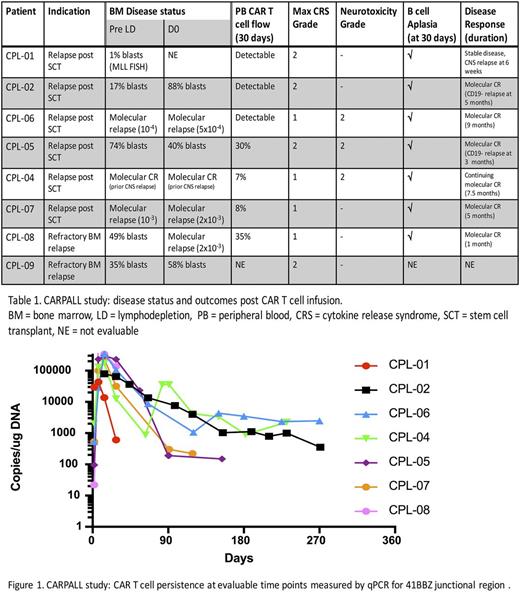Abstract
Introduction:
Published studies of CD19 CAR T cells have shown unprecedented response rates in ALL but with a 23-27% incidence of severe Cytokine Release Syndrome (CRS) and 27-50% incidence of severe neurotoxicity which may limit broader application. We developed a novel second generation CD19CAR (CAT-41BBz CAR) with a lower affinity and faster off-rate but equivalent on-rate than the FMC63-41BBz CAR (Kd 116 nM vs 0.9 nM, T1/2 10s vs 1260s) utilised in CTL019 currently under consideration by the FDA. Pre-clinical studies indicated T-cells transduced with CAT-41BBz mediate enhanced tumor clearance and show increased expansion in an NSG-NALM6 stress test model (Kramer et al., submitted). We here report interim results from a multi-centre, Phase I clinical study of autologous CAT-41BBz CAR T cells as therapy for high risk/relapsed paediatric ALL, CARPALL (NCT02443831) demonstrating efficacy with an excellent safety profile.
Methods:
Autologous T cells were activated with anti-CD3/CD28 beads, transduced with a SIN lentiviral vector encoding CAT-41BBz CAR and expanded for 4 days prior to magnetic bead removal and cryopreservation. Transduction efficiency was assessed using an anti-idiotype antibody. Serum levels of cytokines associated with CRS were measured using cytometric bead array.
All patients received lymphodepletion with fludarabine 150 mg/m2 + cyclophosphamide 1.5g/m2 followed by a single infusion of CAR T cells at a dose of 1x106 CAR+ T cells. Patients were monitored for the presence of CAR T cells in the blood by flow cytometry and by qPCR for the 41BBz junctional region, as well as circulating B cell count monthly for 6 months and then 6 weekly to 1 year. Disease status was assessed in the bone marrow morphologically, by IgH qPCR, as well as by flow cytometric assessment of MRD at the same time-points to establish durability of responses as a stand-alone therapy. The primary end-points were incidence of grade 3-5 toxicity related to CAR T cells within 30 days and the proportion of patients achieving molecular remission.
Results:
We have enrolled 10 patients and treated 8 to date. Six of 8 had relapsed post myeloablative SCT. The median disease burden prior to lymphodepletion was 9% blasts (ranging from molecular CR to 74% blasts, Table 1). It was possible to generate a product meeting release criteria in all but 1 patient (90% feasibility). Median transduction efficiency was 18.1% (range 6.7 to 76.3%). All treated patients received the anticipated dose of 1x106 CAR T cells/kg.
Cytokine release syndrome occurred in all patients (grade 1 n=4, grade 2 n=4), but to date none have developed ≥ grade 3 CRS, required ICU admission or therapy with Tocilizumab. CRS was associated with modest elevations of IL-6, IFN-γ and IL-10 and resolved spontaneously in all. Grade 2 neurotoxicity was observed in 3 patients and resolved spontaneously, but no severe (≥grade 3) neurotoxicity was seen. Five patients had prolonged grade 4 neutropenia lasting > 30 days but this resolved in all by 2 months. Only 1 patient experienced significant infective complications in the context of pre-existing poor marrow reserve following allogeneic SCT.
6/7 (86%) evaluable patients achieved molecular remission at a median of 30 days post infusion (range 30-60 days, Table 1). One patient did not respond and died of CD19+ disease progression. At a median follow-up of 5.9 months (range 28-328 days), 4/7 evaluable patients remain in flow MRD negative remission of whom 3 show no evidence of molecular MRD at 1, 7.5 and 9 months. Two patients relapsed with CD19- disease at 3 and 4 months post infusion: 1 of these remains alive with disease at 11 months and the other died of disease progression.
Reflecting our pre-clinical data with CAT-41BBz CAR, we have seen excellent CAR T cell expansion (median 65459 copies/µg DNA at 1 month, range 609 to 230112) and persistence at up to 11 months post-infusion (Figure 1). All 7 evaluable patients have ongoing CAR T cell persistence detectable by both flow and qPCR as well as ongoing B cell aplasia at last follow-up.
Conclusions:
These interim results with a novel low affinity CD19 CAR show similar remission rates to those reported by US studies in paediatric ALL with an improved safety profile. No severe (grade ≥3) CRS or neurotoxicity has occurred to date despite high tumour burden in 4 patients. Excellent CAR T cell expansion has been documented, as well as long duration of CAR T cell persistence and associated B cell aplasia.
Ghorashian: UCL: Patents & Royalties: UCL Business. Kramer: UCL: Patents & Royalties: UCL Business. Lucchini: Alexion: Membership on an entity's Board of Directors or advisory committees. Pule: Autolus Ltd: Employment, Equity Ownership, Research Funding; UCL: Patents & Royalties: UCL Business.
Author notes
Asterisk with author names denotes non-ASH members.


This feature is available to Subscribers Only
Sign In or Create an Account Close Modal